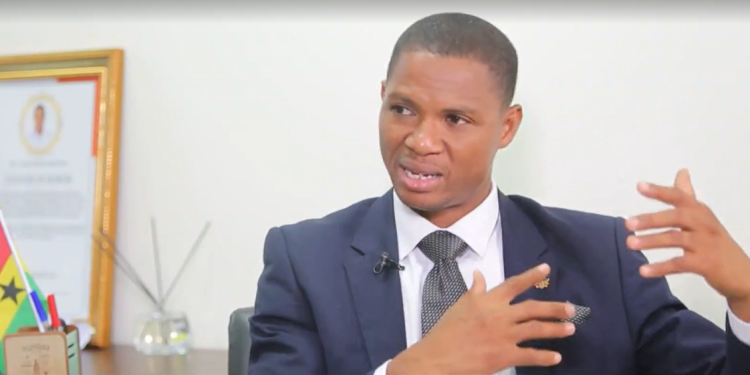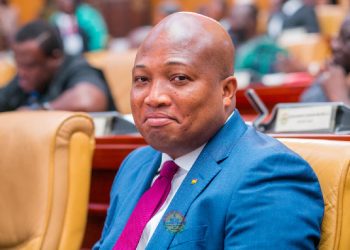The Member of Parliament for the Madina constituency, Francis-Xavier Sosu is calling for the implementation of policies that will make it mandatory for persons with disabilities to be employed in various organisations.
He said persons with disabilities continue to suffer discrimination despite the many anti-discriminatory laws enacted to protect them.
“This law when enacted will provide for compulsory employment of PWDs in all public and private institutions and also provide for related matters. We must do more to protect the rights of marginalised persons and vulnerable groups and ensure that we steadily lift the majority of our people across the poverty line,” he said in an article.
Read the full article below:
BACKGROUND
Disabled persons in Ghana continue to experience various forms of discrimination and social exclusion. These occur despite the fact that there are several anti-discriminatory laws that are meant to protect the rights of disabled people and facilitate their participation in mainstream social, political and economic activities. As it is, the laws have not completely eroded the discrimination and in some instances, appears to have even institutionalised the discrimination that disabled people experience. It is important that the state pays more attention to amending aspects of these laws and putting them into practice (Ocran, 2019).
According to data from the World Health Organisation (WHO), 15% of the world’s population, representing some 1billion people suffer one form of disability. Out of this number, 80% are found in developing countries. In Ghana, data from the Ghana Statistical Service (GSS) shows that 8% of Ghana’s population representing some 2.4million persons have some form of disability as compared to 3% in 2010. It is sad to note that with this number and in a democratic country such as ours which prides itself with respect for the fundamental human rights of persons, no strategy or laws exist to ensure the employment of PWDs despite their academic heights, success or qualifications. In simple terms, our society does not seem to consider PWDs as productive components of mainstream society. It is time to change this narrative.
CURRENT STATE OF PWDS IN GHANA
From the recent stakeholders meeting held on Thursday, 28th April, 2022 organised by the Ghana Disability Forum with the various federations of PWDs in attendance, some of the challenges faced by PWDs in Ghana include; aaccessibility barriers in built environments including transport, products and services. A general lack of awareness of disability in the workplace leading to misrepresentation and stigma, insufficient disability support services and a lack of inter-agency liaising, non-inclusive education and vocational training leading to lower levels of education and training among persons with disabilities.
There is also the problem of a lack of structured support for younger people with disabilities when making the transition from school to work, due to the dearth of awareness and confidence on how to include persons with disabilities in the workplace. It was also noted that there is a misplaced fear of legal challenges by employees with disabilities if employment does not work out. Work premises and work tools, including Information and Communication Technologies is mainly inaccessible. Another major problem PWDs face is the lack of support for persons with disabilities to secure and maintain employment due to little or no information and support for companies considering the employment of persons with disabilities.
Until recently, a major government intervention, that ensured that most PWDs had some form of employment, thus guaranteeing their livelihoods by manning toll booths, was abruptly ended further exacerbating the plight of many PWDs. Also, considering that Ghana and the rest of the world was recovering from the devastating effects of the Covid-19 pandemic, this meant PWDs in the country had been dealt a heavy blow.
Again, despite a stipulation by the District Assembly Common Fund (DACF) Act 1993 that two percent of the Fund be given to Persons with Disability to among others, support their businesses, the lack of adequate and prompt payment of the Common Fund makes this law ineffective and barely enforceable to the detriment of PWDs, leading to increased marginalisation of PWDs, particularly female PWDs.
TIME IS RIPE TO ENACT LAWS TO ENSURE MINIMUM EMPLOYMENT OF PWDS
As a society, the time is ripe to enact laws and policies that can ensure minimum employment of PWDs. This law when enacted will provide for compulsory employment of PWDs in all public and private institutions and also provide for related matters. We must do more to protect the rights of marginalised persons and vulnerable groups and ensure that we steadily lift the majority of our people across the poverty line. As such, a deliberate policy such as the introduction of a minimum percentage employment (5%-20%) of PWDs will go a long way to create a more fair, open and inclusive society that not only respects but guarantees individual rights and freedoms. Such a policy will also accelerate achievement of SDGs 1, 2, 3, 4, 5, 8 and 10 which read No Poverty, Zero Hunger, Good Health and Wellbeing, Quality Education, Gender Equality, Decent work and Economic Growth and Reduced Inequalities.
LEGAL JUSTIFICATION FOR THE CALL FOR SPECIFIC LAWS AND POLICIES IN SUPPORT FOR EMPLOYMENT OF PWDS
Convention on the Rights of Persons with Disabilities
Our world today has excluded persons with disability from society, and at the same time, denied them their basic human rights. It is worth noting that, discrimination against persons with disabilities occurs in various forms ranging from individual discrimination, such as the denial of employment opportunities, to segregation and isolation because of the imposition of physical and social barriers. It is for this reason that there are various international human rights instruments to protect their basic human rights. One of the founding principles of the Convention on the Rights of Persons with Disabilities is to emphasize the importance of mainstreaming disability issues as an integral part of relevant strategies for sustainable development. To wit, this Convention requires State Parties to recognize the right of persons with disabilities to work on an equal basis with others; this includes the right to the opportunity to gain a living by work freely chosen or accepted in a labour market and work open environment.[1]
It is also to be noted that, all member countries are obliged to promote the training of professionals and staff working with persons with disabilities in the rights recognized in the present Convention to better provide the assistance and services guaranteed by those rights and provide training in mobility skills to persons with disabilities and specialist staff working with persons with disabilities.[2]Imputing an end to such acts.
International Covenant on Economic, Social, and Cultural Rights
Article 3 of the International Covenant on Economic, Social, and Cultural Rights requires State Parties to ensure the equal right of men and women to the enjoyment of all economic, social, and cultural rights outlined in the present Covenant, therefore, men and women including persons with disability are to have equal rights.
International Covenant on Civil and Political Rights (ICCPR)
Additionally, Article 26 of the International Covenant on Civil and Political Rights (ICCPR) states that “All persons are equal before the law and are entitled without any discrimination to the equal protection of the law. In this respect, the law shall prohibit any discrimination and guarantee to all persons equal and effective protection against discrimination on any ground such as race, colour, sex, language, religion, political or other opinion, national or social origin, property, birth or other status.”
African Charter on Human and Peoples Rights
Also, Article 15 of the African Charter on Human and Peoples Rights which reads “Every individual shall have the right to work under equitable and satisfactory conditions, and shall receive equal pay for equal work.”
United Nations Convention on the Rights of the Child
Tellingly, the Convention on the Rights of the Child gives a deeper insight that it is required of State Parties to recognize mentally and physically disabled children to enjoy a full and decent life, and also protect them from economic exploitation and from performing any work that is likely to be hazardous or to interfere with their education. At the regional level, the African Charter on Human and Peoples’ Rights seeks to advocate the fundamental human rights among the state parties, particularly emphasizing that every individual shall have the duty to respect and consider his fellow beings without discrimination, and to maintain relations aimed at promoting, safeguarding and reinforcing mutual respect and tolerance.
LAWS OF GHANA
In Ghana, Article 12(2) of the 1992 Constitution of Ghana states that “Every person in Ghana, whatever his race, place of origin, political opinion, colour, religion, creed or gender shall be entitled to the fundamental human rights and freedoms of the individual contained in this Chapter but subject to respect for the rights and freedoms of others and for the public interest.” Article 15(1) of the Constitution also states that “The dignity of all persons shall be inviolable”. Article 17(1) and (2) of the Constitution further states that “All persons shall be equal before the law” and “A person shall not be discriminated against on grounds of gender, race, colour, ethnic origin, religion, creed or social or economic status.” The above provisions of the 1992 Constitution of Ghana, which is the supreme law of the land prohibits discrimination against people based on their race, religion, gender, and their physical appearance. With this assertion, the Disability Act of Ghana further requires any employer that employs a person with a disability to provide any relevant working tools and appropriate facilities required by the person with a disability for the efficient performance of the functions required by the employment. Section 9 of the Persons with Disabilities Act 2006 (Act 715) states that “The Ministry shall through the public employment centres, assist to secure jobs for persons with disability.” Despite this obligation on the state, employment issues with respect to persons with disability remains a major problem due to the absence of clearcut policy directions and interventions.
RECOMMENDATION
I strongly recommend the enactment of Employment of Persons with Disability Act, to exclusively deal with employment matters and related matters of Persons with this ability. This piece of legislation will aim to ensure minimum employment of PWDs to guarantee their rights and ensure a more open, fair and inclusive society. My office is working with key stakeholders to initiate a Private Member’s Bill to achieve this objective once Parliament resumes.
Also, as noted by key Stakeholders in a recent dialogue on the theme Participation of PWDs on the labour market, there remains a critical challenge of lack of comprehensive data on PWDs and related profiling that includes capabilities of PWDs. I therefore wish to entreat Government to ensure the prompt collation of necessary data to ensure that this challenge is addressed.
Healthcare services must also be made free for PWDs to guarantee good health and wellbeing of PWDs in Ghana. This will go a long way to reassure PWDs that they remain key components of mainstream society.
Again, the two percent share of District Assemblies Common Fund meant for PWDs ought to be regularly reassessed and readjusted to inflation to ensure that PWDs are not discriminated against. Also, strict payment and compliance measures ought to be put in place at the local government level to effective enforcement of the law.
CONCLUSION
In conclusion, I call on the Government and other key Stakeholders such as the Ghana Employers Association (GEA) and Trades Union Congress (TUC) to take active measures and support the introduction of legislation that will ensure mandatory minimum employment of PWDs in Ghana. As noted by former President of Ireland, Mary Mcaleese, “People with Disabilities have abilities too and that is what this course is all about – making sure those abilities blossom and shine so that all the dreams they have can come true.” On this auspicious occasion of May Day Celebrations, a day set aside for celebration of workers in Ghana, our course must be to create a society of opportunities that allows the dreams and aspirations of PWDs to come true.
——
The writer, Hon. Francis-Xavier Sosu, is a private legal practitioner, human rights activist, Member of Parliament for Madina Constituency, Member of the Appointments Committee, and Deputy Ranking Member of the Constitutional, Legal and Parliamentary Affairs Committee, with background expertise in Economics, Conflict, Security and Peace Studies. The writer can be contacted via: francisxavier.sosu@gmail.com www.madinamp.com
[1] Article 27(1) of the Convention on the Rights of Persons with Disabilities and Optional Protocol
[2] Article 4(g) and 20 of the Convention on the Rights of Persons with Disabilities and Optional Protocol















